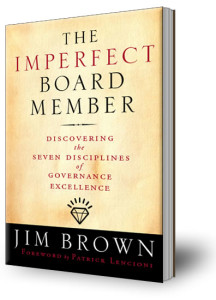 I got into trouble for doing what I thought was a good thing. I wrote a letter to the paper.
I got into trouble for doing what I thought was a good thing. I wrote a letter to the paper.
I challenged the Minister of Health to come down to our hospital, Hospital X, and see for himself patients languishing in hallways, ambulances backed up.
I dared him.
The board Chair blew up. The CEO, the Chief of Staff, the President and the Vice-President of the Medical Staff Association delivered angry lectures.
My department Chief scolded me. I felt really stupid.
Worthy motives cannot ignore politics. Truth needs a proper package to drive influence. When a wall blocks our path to freedom, truth told for its own sake can make the wall collapse on top of us instead of opening to freedom.
What do Boards do?
Boards govern organizations. They do not manage them, staff do. Boards meet a few times per year, or as often as once per month.
Jim Brown lays out core functions for board directors in his little book, The Imperfect Board Member: Discovering the Seven Disciplines of Governance Excellence (read it!).
Here are a few of the facets and responsibilities of a board of directors:
Reflect – Understand and think about the results of the organization’s operations and the rationale for deviations from projections.
Respect – Listen. Listen to understand the members; invite input from members; help members understand board actions and organizational results.
Select, Redirect, Eject – choose people with the skills, values and credibility to fulfill key responsibilities; remove them if they compromise the organization’s effectiveness.
Direct, Protect – define and refine the vision, mission and values; determine key results areas; create and use a monitoring system.
Expect, Inspect, Correct – Articulate board expectations of the organization and CEO and maintain them. Understand and comply with expectations within the board and contribute to an effective team.
How to Influence a Board
Ideally, all board directors put themselves in your shoes. They show deep understanding and compassion, like your Grandma. But even Grandma loses compassion, if you pick a fight.
Do you want influence? Address what matters to others.
Positive influence drives controlled change towards a known target. Attack creates reaction, unknown and uncontrolled. Try to repackage your issue into a board issue. For example:
- Talk about how your issue represents a larger problem.
- Demonstrate that you understand the challenges the board faces.
- Find something, anything, positive to say.
- Offer help.
- Suggest a solution.
- Gracefully answer questions, even when questions prove your audience doesn’t ‘get it’.
- Speak for a group. Numbers matter.
Write Smart Letters
What emails do you read right away? What gets deleted before opening?
We cannot resist emails addressed to us, from people we know, about issues with personal meaning. If you want to make a big impact, you need relationship.
Focus attention on one or two people. Use the list above. Add value. Make them want to open your emails. Then hit them with what you want changed. Remember, long lists of complaints sent to a big group are a waste of time. They get deleted.
Trouble
Churchill said, “You have enemies? Good. That means you’ve stood up for something, sometime in your life.”
No matter how polished your politic, you will irritate. But if you influence well, you can get in trouble for doing good things and not feel stupid about it.

The hardest thing I ever learned at a Board table was how to keep my mouth shut.
Brilliant advice, Kathleen!
Thought-provoking and helpful. I’m going to get the book! Thanks.
Excellent! It’s a very quick read. You can often find copies at used bookstores.
Thanks for taking time to share a comment!
Cheers
Shawn
Shawn,
For those of us who sit at Board tables, this is a brilliant find.
I have seen you put those points into action over and over!
Always the right wise thing to say at the right time..
D
Thanks Darren!!
I learned it from watching you. 😉
Sorry for taking so long to reply. I’ve been at the cottage.
Thanks for taking time to read and share a comment!
Cheers